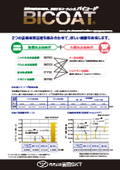What is poor release type? Methods for improvement and ways to reduce the use of release agents.
What is release failure during molding? We will introduce useful information for when you want to reduce product release applications and adhesion.
"Release failure" refers to the situation where materials do not easily separate from the mold during the molding or processing of products, leading to defects or damage. Such failures can reduce product quality and potentially increase costs. **Ways to Improve Release Failure** - **Use of Release Agents** By selecting the appropriate release agent and using the right amount, materials can be made to separate easily from the mold. - **Design Improvements** Improving the design of the mold can make it easier for materials to release from it. - **Material Changes** Choosing suitable materials, such as those with good release properties, can help improve release failure. - **Improvement of Molding Conditions** Enhancing molding conditions can lead to improvements in release failure. - **Regular Maintenance** Conducting regular maintenance on molds and machines can prevent troubles during molding. - **Utilization of Surface Treatments** Applying non-stick (release) surface treatments to molds can improve molding troubles, reduce the use of release agents, and decrease the frequency of mold maintenance. By appropriately combining these methods, improvements in release failure can be expected.
Inquire About This Product
Related Videos
basic information
What is the improvement of release properties through surface treatment? By choosing a surface treatment with non-stick and good release properties, molding troubles can be improved. "Non-stick" refers to the property that makes it easy to release from strongly adhesive materials, meaning it either does not adhere or adheres very weakly. Coatings that utilize such functions are effective for release applications, applications where adhesion needs to be minimized, and for simplifying cleaning. 【Selected Coatings (Partial)】 ■ Release properties, high hardness, dimensional stability (durable parts, molds) - Bi-Coat ■ Resin release at high temperatures - FSR Coating ■ Prevention of adhesion of high-viscosity materials - Adhesive release coating - CTT Fabric Sheet - MRS Coating (Silicone-based coating) ■ Release properties, precision, water repellency, oil repellency, liquid sliding properties (precision parts, precision molds) - Nano Process *For more details, please refer to the PDF document or feel free to contact us.
Price range
Delivery Time
Applications/Examples of results
For more details, please refer to the PDF document or feel free to contact us.
catalog(9)
Download All Catalogs


![[Case Study] Improvement of Mold Release: "Super Durable Fluorine-based Organic Coating System Bycoat®" "Improvement Case"](https://image.mono.ipros.com/public/catalog/image/01/252/582930/IPROS69680807362581966606.jpeg?w=120&h=170)
![[Case Study] Improvement of Rubber Molding Conveyance Process: "Reduction of Contact Area Fluorine Release Coating" "Improvement Case"](https://image.mono.ipros.com/public/catalog/image/01/866/582931/IPROS58142070841232716258.jpeg?w=120&h=170)
News about this product(1)
Company information
To maximize the performance of manufacturing equipment and machine parts, Yoshida SKT derives the "optimal solution" tailored to our customers from hundreds of surface treatment technologies. - Decreased productivity due to adhesive troubles - Instability in product quality due to friction - Early deterioration of equipment due to corrosion We respond to these challenges in the manufacturing field with our extensive track record and reliable technical expertise. In 1963, we began fluoropolymer processing. In 1968, we signed a licensing agreement with DuPont (now Chemours), supporting manufacturing innovations for over 2,000 customers across various industries, from automotive to medical and aerospace. Furthermore, in 2024, we are focusing on the development of next-generation products, such as PFAS-free coatings, contributing to the advancement of sustainable manufacturing. With a three-base system in Nagoya, Tokyo, and Yamaguchi, we flexibly respond to both mass production and custom orders. Our consistent quality management system ensures that we deliver reliable quality. For solving challenges in the manufacturing field, trust the surface treatment experts at Yoshida SKT.




![[Case Study] Improvement of Cutter Blade Adhesion: "Thin Film Release Coating" "Improvement Case"](https://image.mono.ipros.com/public/catalog/image/01/b2d/582932/IPROS24078893243197209003.jpeg?w=120&h=170)



![[Case Studies] 15 Common Concerns: 7 Release Properties](https://image.mono.ipros.com/public/product/image/ffe/2000360383/IPROS5765229322187063453.jpg?w=280&h=280)
![[Case Study] 15 Common Concerns: 8 Release Properties](https://image.mono.ipros.com/public/product/image/ba9/2000360389/IPROS867275926466865472.jpg?w=280&h=280)






![Micron-level precision, high difficulty × short delivery time! Precision cutting processing [Processing case examples available].](https://image.mono.ipros.com/public/product/image/2070746/IPROS9035842601074547405.png?w=280&h=280)